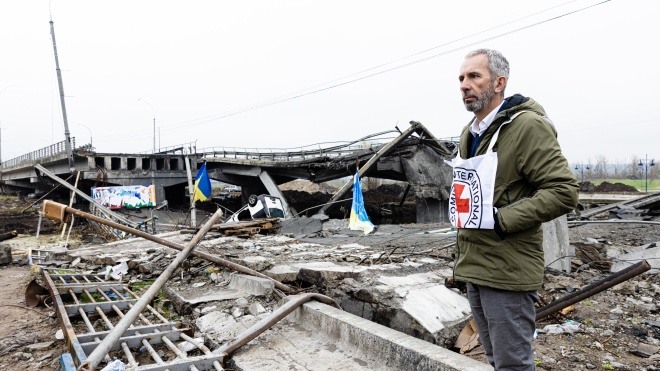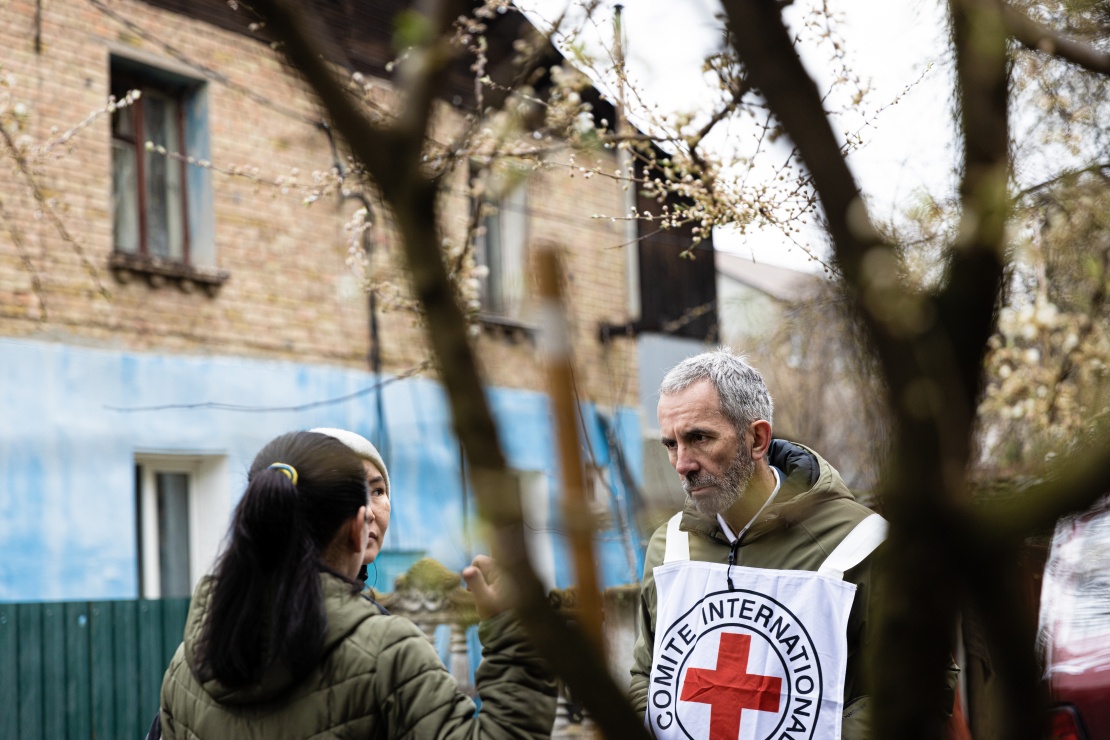You arrived in Ukraine on April 20. Why and what are your impressions?
I am the ICRCʼs operations director all over the world, so I travel to countries where there are armed conflicts — wherever there is a Red Cross. My task is to set priorities so that the ICRC can make better use of available resources. We will also discuss with the Ukrainian Red Cross how to help the victims better.
My main goal is to see for myself the consequences of the armed conflict and the effect it has on citizens. We were in Bucha and Irpin. I looked at the destruction, talked to people who stayed in the cities all this time. You can feel how traumatized they are and how hard they went through everything that happened.
«Babel'»
Your task is to set the priorities. What are they?
The first is to provide vital assistance to people in the immediate vicinity of hostilities. We saw what happened in Irpin and Bucha. But more intense fighting is taking place in the east and south of the country. So now our main efforts will be focused there.
If we talk about more distant priorities, it is providing people with access to vital resources, such as water. We have a large-scale project in Irpшn with Kyiv water supply operator, and we are working on connecting the Irpin water supply system with the Kyiv one.
«Babel'»
By the way, about water. Ukrainian human rights activist Larysa Denysenko described the process as one of the ICRC staff members spent five days finding out what people evacuating from an active combat zone to the city of Dnipro needed. And then the ICRC delivered water there for almost another month. Such work provokes criticism. How can you comment on this?
Of course, I understand how people have been affected and that they have a lot of dissatisfaction. From organizations like ours, miracles are often expected. Believe me, we are doing everything we can, we learn from mistakes to help the victims as soon as possible. We have learned many lessons from countries such as Syria, where critical urban infrastructure has had to be rebuilt. The project in Irpin to provide residents with water as soon as possible is also large-scale. But in such situations, people will always think that little is being done.
«Babel'»
You are criticized not only by human rights activists. In particular, Deputy Prime Minister for the Reintegration of the Temporarily Occupied Territories Iryna Vereshchuk said in early March that she expected more help from ICRC to the civilian population.
We have seen huge humanitarian consequences in a very short time — literally a few weeks. Of course, a quick reaction here is beyond the capabilities of an individual humanitarian organization and even all humanitarian organizations altogether. Weʼve been operating in Ukraine since 2014 and have concentrated our efforts in the east of the country and in Kyiv. Even when many organizations left, our employees remained in Kyiv.
We work in those regions of the country that have suffered the most. We try to work close to the front line. 75 polyclinics and hospitals were supported. Our staff evacuates the least socially protected people from such cities as, for example, Sievierodonetsk and Kramatorsk. But I also want us to do more. Unfortunately, today there are no specific agreements between the sidews to the conflict that would allow us to visit Mariupol, cross the lines of hostilities to help people in this situation.
«Babel'»
That is, the ICRC is, by definition, neutral and trying to have a dialogue with everyone?
We always strive to establish a dialogue with all parties involved in the conflict — not only here, but everywhere we work. The goal is to help people. The dialogue is at different levels: we have contact with Iryna Vereshchuk and other government officials. We donʼt have a problem with communication on both sides, but the problem is that the agreements are broken and there is no agreement on specific issues. And again: to announce tonight that there will be a humanitarian corridor from 12 pm to 6 pm tomorrow… We have experience working in many conflicts around the world. And we know that in order to organize a really serious humanitarian operation, a "window" is needed for at least three days. People have to choose: to stay put in a situation where there are very heavy fighting, or to try to leave.
«Babel'»
Why is it not possible to organize humanitarian corridors from Mariupol?
We need very specific, precise agreements — on what day, time, which way, who can leave, whether we can bring humanitarian aid. But they donʼt exist.
A few weeks ago, the ICRC staff tried to organize a corridor and evacuate people from Mariupol. For five days, they managed to advance several kilometers to the city every day. And when they were about 20 kilometers from Mariupol, the fighting was so intense that it was impossible to get closer. So they gathered all the people who were in the area and took them out. I gave this example to show that we try and even put our employees in very unpleasant and dangerous situations. But the warring parties have no concrete agreements.
«Babel'»
Letʼs continue with the topic of Mariupol. Many people are being smuggled out to Russia, and Russia is setting up filtration camps. According to unverified information, Russian office of the ICRC deals with people who enter Russia. Is there any connection with those who were taken away?
I know about these accusations, they are completely baseless. The ICRC has never supported and would not support the deportation of people against their will. This is completely contrary to our principles.
We donʼt have an office in Rostov now. This has been much debated in the public sphere. We want to have offices around the perimeter [of the conflict zone]. The conflict and its consequences are so large that they also affect border areas. The main thing for us is to be present in all areas and to support all victims. We helped people to leave safely, but only in directions they wanted. We organized such operations in Sumy, Sievierodonetsk, Kramatorsk, Mariupol.
As for contact with people — we do not have it, because there is no presence on the ground. It is necessary for us to have information and to be able to assess the humanitarian consequences with our own eyes. We have a delegation in Moscow. We are having a dialogue about the Rostov office — so far it is an idea and negotiations.
Support Babel: 🔸 donate in hryvnia 🔸in cryptocurrency 🔸 PayPal:[email protected]


